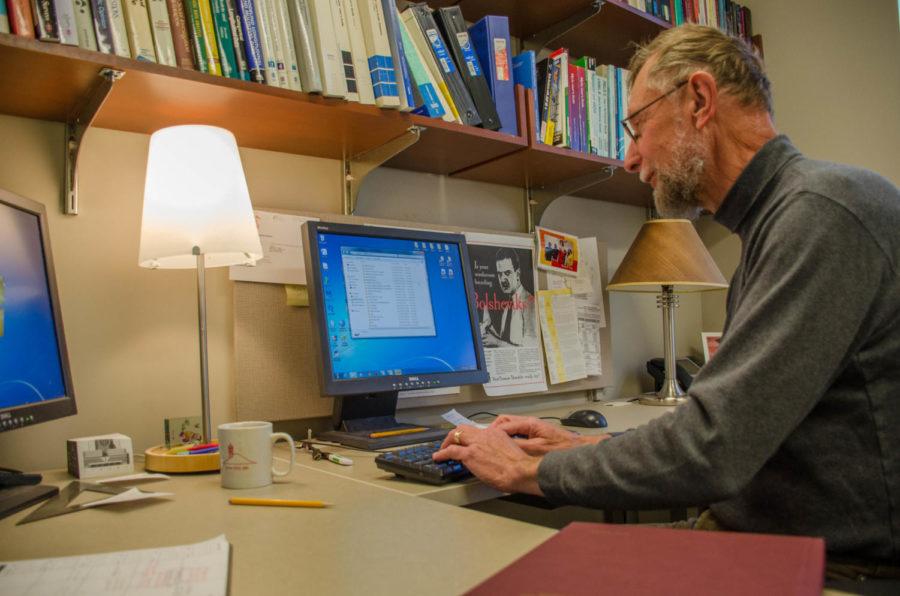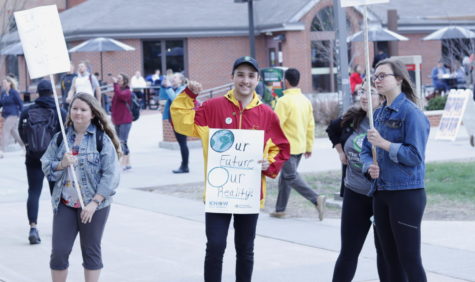Family Transitions Project receives $2 million grant
Schuyler Smith/ Iowa State Daily
Frederick Lorenz is a researcher for the Family Transitions Project. The project received a $2 million grant to continue research on families through the course of their lives. The grant will help researchers study parents who are entering the age for retirement.
January 27, 2015
With nearly $2 million in their pockets, the Family Transitions Project in Ames will soon begin research on couples in late adulthood.
The Family Transitions Project, a research initiative that studies the evolution of families, recently received a $1.9 million grant from the National Institute on Aging to continue its research.
“$2 million sounds like a lot of money and it is,” said Fred Lorenz, co-principal investigator and professor of psychology. “I think any time you want to do what we would consider leading-edge research, it’s going to take a lot of measurement. Doing good research is expensive.”
The study initially began back in 1989 in order to assess how families were responding to the farm crisis that was happening in Iowa at the time. The study revolved around a “target”, who was a 13-year-old at the time, called “Generation One.”
As these “targets” have grown older, the project has also grown in order to incorporate the new third generation of the targets’ children.
“It’s expensive to collect data on families,” said Tricia Neppl, co-director of the study and assistant professor in human development and family studies. “We’re going back to the original parents and assessing how their relationships as couples have evolved and changed over time.”
With this new grant, the project hopes to understand more about these older couples and why they make the decisions that they do.
“I think the promise to learn how couples adjust to each other over time is important,” Lorenz said. “In recent years, the divorce rate of people over 60 has gone up remarkably. It is a much larger social issue than it was a decade ago.”
The grant will help cover costs including things such as paying staff members, equipment to videotape the couples and traveling costs.
Data collection and research is all done in the homes of the participants and with nearly 2,400 of them, travel costs add up quick.
“What’s cool about this study is we have followed these targets wherever they have ended up,” Neppl said. “About 70 percent of them are still in Iowa but the other 30 percent are all over the country. We value them so much, we’ll follow them wherever they are living.”
With this new grant, the project will be able to compare the relationships of the target’s parents with the last time data was collected on them in 2001, when the parents were at midlife.
This longitudinal study is done on many levels, assessing participants on all aspects of their lives, which includes but is not limited to social, work, financial and romantic aspects. This study is unique in that genetic data has also been collected from the participants.
Lorenz believes that the genetic material isn’t the only thing that sets their study apart from others
“What’s interesting about our data is that we have couples data,” Lorenz said. “A lot of studies that look at retirement interview men and women, but not husbands and wives.”
Neppl, whose interest is in both family and individual stress, says that one of the study’s biggest findings is something called the “Family Stress Model”.
“What we have found is that in families who are experiencing economic hardships or pressures, they become emotionally distressed,” Neppl said. “That emotional anxiety impacts the quality of their romantic relationship and that impacts their parenting.”
Since the last wave of data was collected in 2011, Neppl says the project is eager to reconnect with many of the families who’ve been with the project since its beginning.
“A lot of these families take great ownership in the project. A lot of them have been doing this their whole lives, having us come into their homes and be gracious with their time and energy has been amazing for us. They want to share their stories and for us to learn from them.”

















